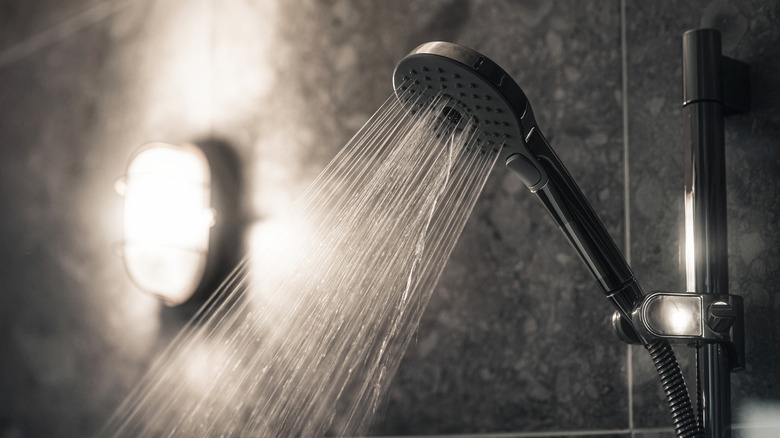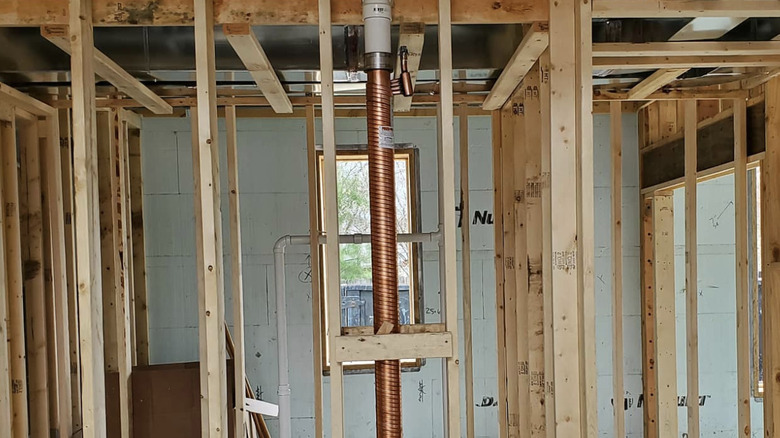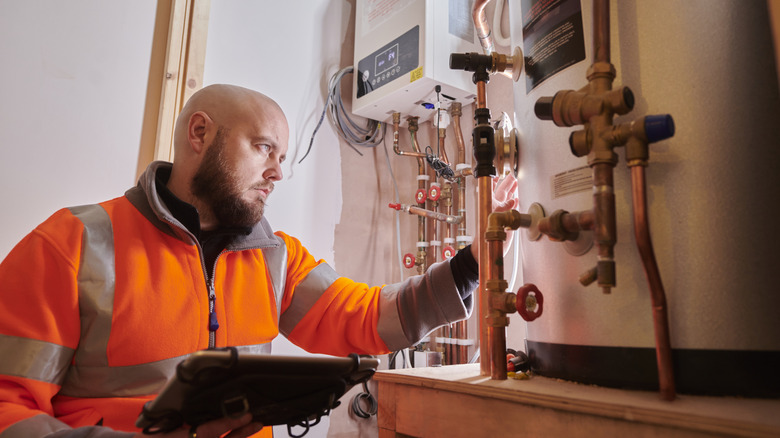Installing A Drain Heat Exchanger In Your Shower Could Save You Big On Energy Cost
We may receive a commission on purchases made from links.
There's nothing more relaxing than a hot shower... until you run out of hot water and the tap starts running cold. It's even less relaxing when you learn how much energy gets wasted, with 80 to 90% of the energy used to heat your water going down the drain — literally. There's a solution that's as straightforward as it is effective: a drain water heat exchanger.
There are two main types of drain heat exchangers: the more basic on-demand type known as a gravity-film heat exchanger (GFX), and the more complex and expensive storage type that stores heat for later use in appliances like dishwashers and washing machines. If you're an individual looking to buy this kind of eco-friendly upgrade for your home, you'll likely be looking at the GFX type.
GFX heat exchangers are typically made of solid copper since it conducts heat so well. Like the name "gravity-film heat exchanger" suggests, it operates on the simple principles of gravity and thermal conduction. For the device to work, hot water from your shower flows through a copper pipe wrapped in small diameter copper tubing. This wastewater clings like a film to the inner walls of the pipe as it flows down, and the warmth of that film then transfers heat to the cold water going up the tubing on the outside of the pipe. GFXs' lack of moving parts means the already-sturdy copper isn't as likely to wear out, so your drain heat exchanger can last up to 30 years.
How drain heat exchangers save you money
Drain heat exchangers aren't cheap– the 32-inch version from ThermoDrain will cost you around $300 on Amazon, while the larger 62-inch ThermoDrain heat recovery unit will cost around $600. But in the long term, the energy savings add up.
Heating water uses more energy than you might think. According to a 2016 study, 18% of total residential energy usage was for water heating, and 4% of all energy usage nationally. Working from the assumption that electricity costs $0.15 per kilowatt-hour, a 32-inch ThermoDrain saves $1.16 every hour it's used. For a family of four's average water usage, that can add up to just over $280 per year. The exact cost of electricity and amount saved by a drain heat exchanger will vary based on where you live and the size of the appliance itself, but generally, three to four feet of vertical drain stack can slash your hot water energy consumption by as much as 25%.
Thanks to these savings, a drain heat exchanger pays for itself in 2.5 to 7 years. How long that takes hinges on how often you shower and how warm your incoming water is, which depends on ground temperatures. There are multiple variables affecting your exact savings, but regardless, using a drain heat exchanger will up your home's water heating capacity, so you can use a lower temperature for your hot water heater without sacrificing hot showers.
What to consider before getting a drain heat exchanger
Not every bathroom is well-equipped to install a drain heat exchanger. Since gravity-film heat exchangers work vertically, you'll need at least five feet of vertical drain run. Provided you have the drain line space, GFXes will work with all kinds of water heaters, including electric, gas, solar, demand, and tankless heaters. Unlike their storage counterparts, gravity-film heat exchangers don't come with the ability to stockpile heat for later, so they'll only work in situations where you're simultaneously running hot water and draining it, like showering or running a small sink.
You can theoretically install a GFX drain heat exchanger yourself with enough know-how, but since they cost so much upfront, botching the job is a plumbing mistake you can't afford to make. This may be a plumbing project you should leave to a professional, and the U.S. Department of Energy recommends hiring a qualified plumbing and heating contractor. But once it's installed, it requires little to no maintenance, so you can just relax and enjoy your more energy-friendly hot showers.


